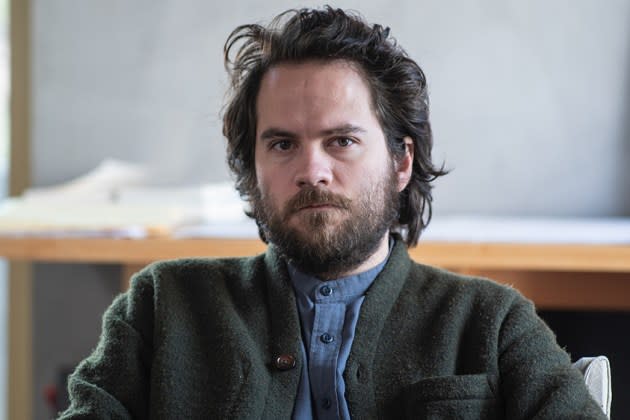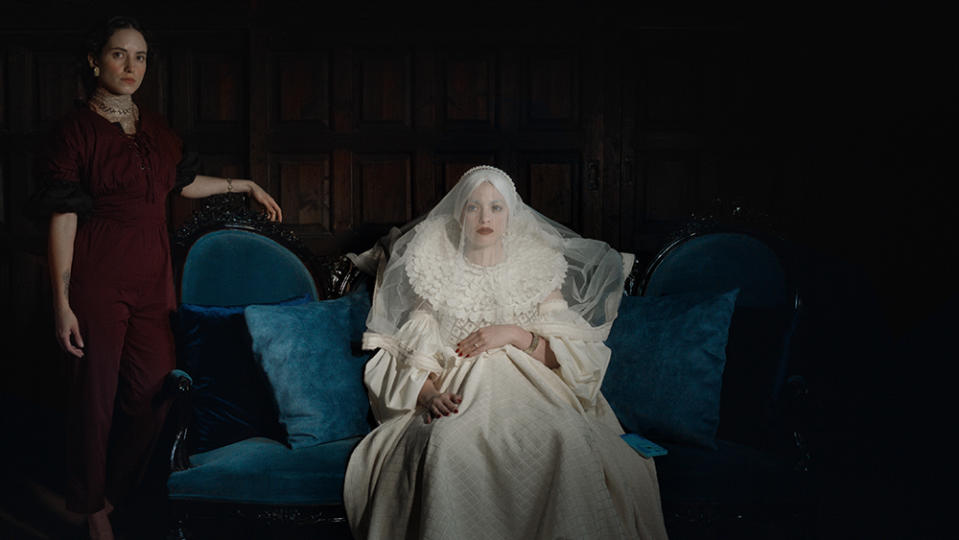Mexico’s Santiago Mohar Volkow Talks Madcap Rotterdam Title ‘A History of Love & War’: ‘Comedy Is Always Challenging Because It’s Constantly Risking Ridicule’

Far-out cineaste Santiago Mohar Volkow (“Los Muertos”) will deliver his fourth feature “A History of Love & War” (“Una Historia de Amor y de Guerra”) to audiences at the 53rd edition of the International Film Festival Rotterdam.
A viscally ludicrous examination of Mexico’s colonial history and the duplicitous nature of high-wealth, the film screens as part of the Harbor strand, dedicated to a wide range of contemporary narratives.
More from Variety
The plot opens on insufferably spoilt and corrupt real estate mogul Pepe Sanzhez Campo (Andrew Leland Rogers) as his mega-mall development plans roil on and an engagement offer to his affluent love interest Constanza (Lucía Gómez Robledo) proves a success.
When militant forces challenge his land rights and an otherwise cliche bachelor party turns sour after his fiancé’s lover Teo (Darío Yazbek Bernal) sets off a rip-roaring tide change, Pepe’s left with a reckoning that derails his privileged future.
Providing a satiating laugh through grand depravity and betrayal, the project manages dastardly whimsy, Pepe eventually becoming an emblem of the country’s brutal past, a tool used to examine residual disparity.
“A History of Love & War” was produced by Mohar Volkow, Santiago de la Paz Nicolau, Santiago Dosal, Jonathan David and Juan Sarquis at Mexico City production outfits Nómadas (“Sísifos”), Laredo 17 (“Natural”) and Edge Films (“Modo Avião”). Executive production credits go to Alejandro Quintero, Juan Simons, García Rulfo, Yazbek Bernal and Leland Rogers.
Manuel García Rulfo (“The Lincoln Lawyer”), Aldo Escalante (“Club De Cuervos”), Mónica del Carmen (“Leap Year”), Florencia Ríos (“The Darkest Days of Us”), Santiago Espejo (“VGLY”), Sharon Kleinberg and Sophie Gómez (“Monarca”) round out the elite cast, with special appearances by Hernán del Riego (“Juana Inés”), Patricia Bernal (“Pobre Rico, Pobre”) and Teresa Sánchez (“Dos Estaciones”).
Ahead of the film’s public debut on Jan.31, Mohar Volkow spoke with Variety about the project.
Mexico acts as the perfect canvas for your bold and vibrant stylistic choices, at once stuck in the past and keenly modern. It’s no doubt that aesthetics are an important part of your cinematic world. Can you speak to coming into your own stylistically?
Most of the films and directors I love the most have strong baroque styles. I guess that when one finally gets the chance to make a film, it’s natural to do something you would enjoy as a part of the audience. I’m bored and fed up with the suffocating limitations of the current naturalism that characterizes most of contemporary cinema, especially in Mexico, where it’s often difficult to tell one film from another.
It’s almost counterintuitive to mimic this international style to fit our stories when our history and culture is so intrinsically baroque. I like to think that this playful engagement with form, breaking away from the imperatives of conventional realism, will also be more appealing to a broader audience that’s normally quite isolated from so-called art house cinema.
The lifestyle of the rich and famous lends itself effortlessly to the absurdity you capture in your projects and you discuss privilege and class hierarchies in many of your films. What’s so attractive about examining the struggles of the proletariat, the vice of the bourgeois?
The rampant inequality one becomes accustomed to living in Mexico is a completely absurd reality that becomes even stranger when we also keep in mind that we no longer see it as an anomaly. This strange dynamic between a world that makes no sense, and a sensibility that somehow manages to find a logic within, is the key experience of Mexico, it’s very difficult to understand yet we live with it everyday. Making a movie that happens in this place will inevitably lead, at least on a personal level, to an attempt at explanation, to understand a little bit more of why things are as they are.

What is the most challenging aspect of working within a comedy and satire framework to explore weighty social topics and why is the final product often so brilliant when well-executed?
Comedy is always challenging because it’s constantly risking ridicule; when it’s done within subject matter that’s current and sensible for a contemporary audience, there’s an aggregate risk of cruelty that we try to avoid naturally. But, sometimes, what may seem like cruelty is actually a form of revelation, and when that is achieved, I believe something truly great is brought to light.
There are also the social and political aspects of dealing with events and subjects that can ignite some sort of backlash, something that becomes more distressing as the size of films gets bigger. Producers, studios and platforms have to deal with these sorts of issues all the time and there really isn’t an easy way out of it because there’s so much money involved, but there’s no doubt that it has an effect on movies being less bold and risky, both in subject and form.
Fortunately, this is a small picture and we really had total freedom to do and say what we wanted. I’m not surprised about the mixed reception it’s gotten, even in its short life before the actual premiere. I don’t think anyone can make a film today and not expect some sort of rejection, so it’s important to take criticism critically and accept that, in some cases, rejection and division are actually compliments.
You use the poignant words of James Baldwin to open the film: “People are trapped in history, and history in them.” How did you incorporate that sentiment into the project?
Baldwin’s phrase is absolutely brutal and true. Even if I read it in another context, the essay in which I found it bears almost no relation to the movie’s plot, it’s such a beautiful and poetic definition of what our political existence is that it holds up no matter where you put it. It rings true when we think of ourselves in the historical context of our countries or even families – so I just thought about that when I was writing the script, trying to understand the characters not only as the agents of their story, but little walking representations of the traumas of our history.
Best of Variety
Sign up for Variety’s Newsletter. For the latest news, follow us on Facebook, Twitter, and Instagram.

 Yahoo News
Yahoo News 
